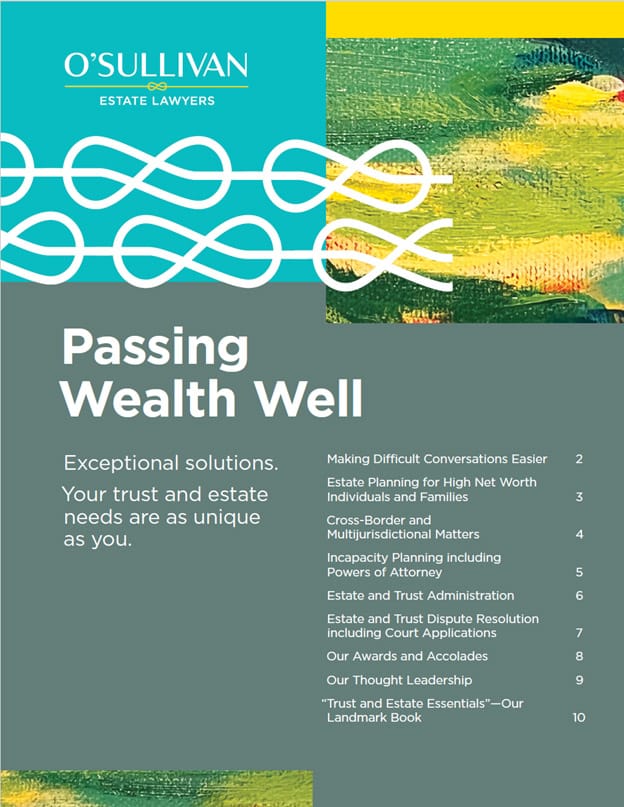Home | Blog
Blog

Celebrating
our 10th year
blog anniversary
Home | Blog
Blog
Toronto Ontario Estate Law Blog
Confidentiality Matters: Thoughts on Death and Privacy
Privacy and the protection of personal data are a major concern in modern society. Complicated privacy legislation exists in many jurisdictions with the objective of protecting personal information by imposing multiple safeguards, some of which can be frustrating to deal with. With the increasing stores of digital information, we also
New Developments in Interjurisdictional Incapacity Planning
With the arrival of fall, many readers may be preparing to escape the pending cold by travelling to warmer climates for extended stays. In our February 12, 2014 blog post we highlighted the potential concerns and practical issues if you become incapable of making either financial or personal care decisions (whether
Family Law – Family Trusts: What Happens When a Marriage Breaks Down?
The Ontario Family Law Act (FLA) determines the division of property between spouses on marriage breakdown. But what happens when a spouse is a beneficiary of a discretionary trust? By way of background, the FLA requires each spouse on marriage breakdown to value his or her “net family property” (NFP).
What’s Tax Got to Do With It? Trust Planning in Wills After Graduated Income Tax Rates are Eliminated
With the advent on January 1, 2016 of the new income tax rules eliminating graduated income tax rates and imposing tax at the top marginal tax rate for testamentary trusts (trusts set up in Wills), some people may be of the view that using trust-planned Wills is far less attractive
New EU Rules for Cross-Border Succession Now Apply from August 17, 2015
When a client dies leaving assets in more than one country, conflict of laws rules (also known as private international law or PIL rules) step in to help determine which country’s law should govern succession of the estate. As outlined in our earlier blog post of July 16, 2013, to
Keeping Your Estate Plan Healthy with Periodic Check-Ups
Your estate plan may only be truly up-to-date the day you sign your estate planning documents. This statement no doubt may dismay you and perhaps be unwelcome, in particular given the effort, time and expense that goes into preparing wills, trusts and powers of attorney. The reality is that our
Moving to the U.S. and Retirement Plans
Persons emigrating from Canada are deemed to have sold all of their property, with some exceptions such as real estate in Canada and retirement plans, for fair market value proceeds and are subject to tax on any resulting gains. Once resident in another country, a person may be subject to
Processes for Activating Powers of Attorney – Do You Know Where Your Documents Are?
Those of you who watch U.S. network T.V. news at night are probably familiar with the catchphrase “It’s 11 (or 10) o’clock. Do you know where your children are?”. Many comedic versions of this phrase have been coined over the years, and it has become part of our modern pop
Trusts and “Total Return” Investing in Challenging Times: Adopting a Winning Approach
One of the perceived disadvantages to using a trust in estate planning is that restrictions on trustees’ investment decision-making under trust law will result in lower investment returns. In particular, this is a concern where a trust has an income beneficiary to whom income is paid, usually for his or
Leaving Wealth Well to the Next Generation and Beyond
From time to time in the news we read about wealthy celebrities and business magnates who have publicly stated that their offspring should not expect to receive any sizeable inheritance upon the parent’s death. In recent years, these pronouncements have come from a variety of people including Sting, Warren Buffett,

Download our “Passing Wealth Well” e-brochure
Learn more about:
- Estate planning for High Net Worth
- Cross-border and multijurisdictional matters
- Incapacity planning
- Representative mandates from clients
- And more…